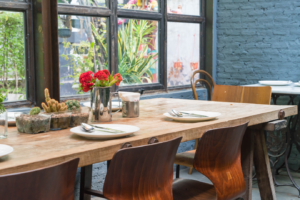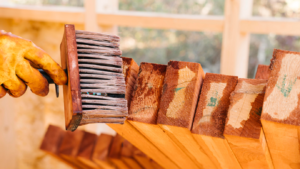Sustainable Business Playbook Feature Industry: Reclaimed wood dining table
Each piece of reclaimed wood carries a unique character, often featuring rich textures and natural imperfections that add to its aesthetic appeal. In addition to its environmental benefits, reclaimed wood furniture often tells a story
- toqqaglobal
- September 18, 2024
- 6:55 am


Making the Furniture industry circular and sustainable by re-claiming wood:
The furniture and home goods industry has become one of the most disposable industries globally with decades long trends away from utilising natural materials and instead using human-made materials manufactured in non-sustainable ways.
 Environmental Initiatives (E):
Environmental Initiatives (E):
- Reclaimed Wood: The dining table is crafted from reclaimed wood, which reduces the demand for virgin timber and helps mitigate deforestation.
- Eco-Friendly Finishes: The finishes and coatings used on the table are low-VOC (volatile organic compounds) or water-based, reducing air pollution and harmful emissions.
- Sustainable Packaging: The product is packaged using recyclable or biodegradable materials to minimise plastic waste.

 Social Initiatives:
Social Initiatives:
- Fair Labor Practices: The table is handcrafted by artisans who are paid fair wages and work in safe and ethical conditions.
- Local Craftsmanship: The furniture brand supports local artisans and craftspeople, contributing to local employment and communities.
- Inclusivity: The brand promotes inclusivity and diversity in its workforce, ensuring equal opportunities for all.

 Governance Initiatives:
Governance Initiatives:
- Transparency: The furniture brand is transparent about its sourcing and manufacturing processes, allowing customers to understand the origin of the reclaimed wood and the production methods.
- Ethical Governance: The company follows ethical governance standards, with a strong commitment to compliance, sustainability, and responsible business practices.
Additional ESG Considerations:
Sustainable Sourcing: The brand ensures that the reclaimed wood is sourced from verified and certified sustainable sources, promoting responsible forest management.
Waste Reduction: The production process minimises waste, with any wood scraps being repurposed or recycled.
Local and Artisanal Support: The brand supports local communities and artisans by sourcing materials and labour locally, contributing to social and economic development.
Customer Education: The brand educates customers about the importance of sustainable and ethical furniture choices, promoting awareness and responsible consumer behaviour.
Product Durability: The dining table is designed to be durable and long-lasting, reducing the need for frequent replacements.
Recycling and Repurposing: The brand offers recycling or repurposing programs for old furniture, reducing waste and encouraging responsible disposal.
Charitable Giving: A portion of the proceeds from each dining table sale goes toward charitable initiatives, such as supporting reforestation efforts or community development projects.
Copyright © 2024 TOQQA Cross Trade. All Rights Reserved.


